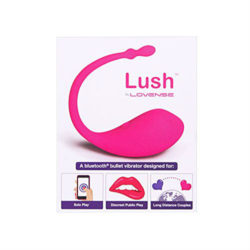Top Class Actions’s website and social media posts use affiliate links. If you make a purchase using such links, we may receive a commission, but it will not result in any additional charges to you. Please review our Affiliate Link Disclosure for more information.

The class action was filed by an anonymous Lovense customer, identified in the complaint as plaintiff S.D. She alleges Lovense fails to notify its customers that its smartphone app-controlled vibrators collect and transmit information about how they are used.
The company does not bother getting customers’ consent to collect that data, she alleges, and is therefore in violation of federal and state wiretapping and privacy laws.
Defendant Lovense, also known as Hyotto Ltd., is a Hong Kong-based company that markets a line of electronic sex toys that can be controlled using a smartphone app. The company sells its products at physical retail locations and through its own retail website.
To use all features of a Lovense product, S.D. says, users must download and install one of a group of smartphone apps – either Body Chat, Lovense Connect, or Lovense Remote.
Body Chat uses a Bluetooth wireless connection to pair the user’s smartphone with their Lovense vibrator, S.D. says. The app gives users full and remote access to their Lovense product’s features. It also allows the user and a partner to exchange text messages and video chats, and they can use the app to control more than one Lovense vibrator at a time.
Promotional materials from Lovense allegedly promise users that its system records “as little information about our users as possible,” according to the Lovense class action lawsuit. The company says all data passed between partners is encrypted, and no pictures, video or chat logs are stored on the company’s servers.
But according to S.D., Lovense purposely designed Body Chat to collect data without customers’ knowledge.
The plaintiff claims Lovense designed Body Chat to collect “highly intimate and sensitive data regarding consumers’ personal use of its Lovense vibrators, including the date and time of each use and the selected vibration settings.”
“[Lovense] fails to notify or warn customers that the Body Chat App monitors and records, in real time, how people use these intimate devices and transmits the collected private usage information to its servers,” the Lovense class action reads. “Nor does Defendant seek consent before it begins collecting and transmitting.”
S.D. says she purchased a Lovense Lush vibrator in 2016, then downloaded and installed Body Chat on her smartphone. She says Lovense collected information about her use of these products without her knowledge or consent. She claims she would never have purchased the Lush vibrator had she known the company would be collecting that data.
Other makers of high-tech sex toys have also come under fire for allegedly failing to properly handle user data. In March 2017, manufacturer We-Vibe agreed to a $3.5 million settlement to resolve claims that it collected data from the users of its Bluetooth-enabled vibrators without those users’ knowledge or consent.
In the Lovense class action lawsuit, S.D. raises one claim under the federal Wiretap Act, a common law claim for intrusion upon seclusion, and an equitable claim for unjust enrichment.
She seeks to represent two plaintiff Classes. The Purchaser Class would cover all U.S. persons who purchased a Bluetooth-enabled Lovense product, and the App Class would cover all U.S. persons who downloaded the Body Chat app and used it to control a Lovense product.
She is asking for a court injunction barring Lovense from capturing customers’ Lovense usage information without their consent and requiring the company to destroy all such information currently in its possession.
S.D. is represented by attorneys Rafey S. Balabanian and Lily E. Hough of Edelson PC.
The Lovense Unauthorized Data Collection Class Action Lawsuit is S.D. v. Hyotto Ltd. d/b/a Lovense, Case No. 3:18-cv-00688-MEJ, in the U.S. District Court for the Northern District of California.
UPDATE: On May 15, 2019, the class action lawsuit alleging that a Chinese-made sex toy unlawfully gathers user data has been kept alive after a California federal judge ruled against a motion to dismiss.
ATTORNEY ADVERTISING
Top Class Actions is a Proud Member of the American Bar Association
LEGAL INFORMATION IS NOT LEGAL ADVICE
Top Class Actions Legal Statement
©2008 – 2024 Top Class Actions® LLC
Various Trademarks held by their respective owners
This website is not intended for viewing or usage by European Union citizens.















47 thoughts onLovense Class Action Says Sex Toys Secretly Collect User Information
There is a lot of girls going to the lovense and you can’t even get a date any more because to many girls r making money online they make more money then the average person that works 8 hours a day
Add me please
Add me too please
We would like to get in on this Class Action Lawsuit Regarding the Lovense Smart App Controlled Remote Vibrator
How can I reach the KL lawyers on the case